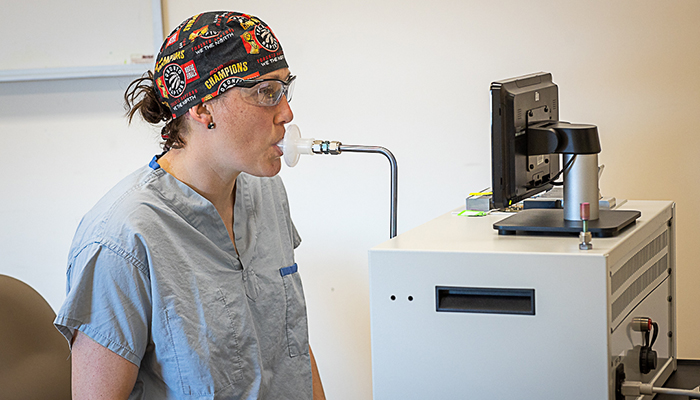Researchers work with new technology to sense COVID-19 on the breath ?

MyLinh Duong and Tim O’Shea are leading a proof-of-concept study with Picomole Inc. to develop and assess its proprietary breath analytics screening technology, which will serve as an additional testing and screening method to identify COVID-19 in the population.
Can your breath show if you have COVID-19? McMaster researchers are using new technology to find out.
McMaster University and New Brunswick-based medical device company, Picomole Inc., are partnering to advance and support COVID-19 screening efforts.
They’ve been awarded nearly $200,000 from the Department of National Defence’s IDEaS Challenge competition, designed to support the Government of Canada’s COVID-19 research and development efforts.
Specifically, McMaster researchers MyLinh Duong and Tim O’Shea are leading this proof-of-concept study with Picomole Inc. to develop and assess its proprietary breath analytics screening technology, which will serve as an additional testing and screening method to identify COVID-19 in the population.
Their project, Breath Analysis of Patients Diagnosed with Covid-19 using Infrared Spectroscopy, aims to examine Picomole’s breath analytics technology by screening for Volatile Organic Compounds (VOCs) in the breath of COVID-19 patients.
Duong and O’Shea are using Picomole’s device to collect patient breath samples from Hamilton Health Sciences and St. Joseph’s Healthcare Hamilton Hospitals. The samples will then be analyzed by the company’s breath analysis technology to generate unique results and distinguish COVID-19 patients from controls.
Duong, a professor in McMaster’s Department of Medicine and a respirologist at Hamilton Health Sciences, says she’s excited to be working with Picomole and employing their novel technology.
“This technology has the potential to provide rapid and non-invasive point-of-care screening and diagnosis of SARS-CoV-2 infections in the community,” she said. “It will facilitate the early and rapid detection of cases and community-based surveillance of COVID-19, which can inform important public health decisions.”
Picomole’s CEO Stephen Graham says he’s confident that the company’s non-invasive screening techniques will be effective in detecting COVID-19, noting the analysis of volatile organic compounds (VOC) in exhaled breath is a proven method that can be used for the detection of disease in a timely fashion.
“Our team is excited to partner with McMaster University and Hamilton Health Sciences in this research project to screen for COVID-19 in breath. These are challenging times for many, and Picomole is eager to be involved in the fight against COVID-19.”
O’Shea, an associate professor in McMaster’s Department of Pathology and Molecular Medicine and an internal medicine specialist at the Juravinski Hospital, says the project is “a great opportunity to bring together a number of different partners in order to improve our diagnostic capabilities with respect to COVID-19.
“We are looking forward to using this project to continue to develop links with our partners both locally and more broadly to continuously improve the health of our community,” he said.
Karen Mossman, McMaster’s vice-president of research, saluted the federal government for investing in Canadian innovation at such an important time.
“Partnerships are critical to advancing our country’s R&D capabilities, particularly when it comes to ending this pandemic and preparing for what comes next,” she says, adding this is exactly why McMaster launched Canada’s Global Nexus for Pandemics and Biological Threats.
“This early work with Picomole holds such promise for Canadians and has the potential to shape and inform public health policies for years to come.”
The success of the study – which will be complete in June – will enable Picomole’s technology to be scaled to population and will be a major step forward in the field of COVID-19 detection.
The IDEaS COVID-19 Challenges grants target four areas of development including: workspace sanitization; pandemic decision making; reuse of protective equipment; and moral trauma on the frontline.
Category, Research Project
